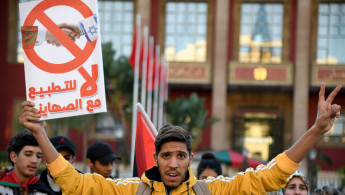Moroccan anti-normalisation activists burn Israeli flag in front of Rabat's parliament
Moroccan anti-normalisation activists set on fire the Israeli flag in a sit-in on Thursday, 7 September, in protest of the now-cancelled visit of Rabat's head of counsellor's house to the Israeli Knesset.
In Rabat, several members of the National Action Group for Palestine gathered Thursday evening in front of the Parliament, chanting against "the shameful normalisation policy of the state" and "the betrayal of the Palestinian cause."
The sit-in was a response to a scheduled official trip of Ennam Mayara, the head of Morocco's House of Councilors, to Tel Aviv in an official visit to the Knesset.
However, Mayara cancelled his controversial visit at the last minute after a health emergency, according to the press release published on the Moroccan parliament website.
Mayara, who has embarked on an official tour to Jordan, Palestine and Israel, is currently hospitalised in Amman over an urgent health condition that Rabat's statement did not detail further.
After news of the trip's cancellation, several pro-Palestine organisations, in turn, called off their participation in Thursday's sit-in.
However, several leading figures of the growing anti-normalisation movements in the North African Kingdom have decided to take to the streets, nevertheless, as the core issue persists: normalisation.
"Canceling the visit does not cancel the (state) commitment, against the will of the people, to the normalisation with the Zionist occupation entity and its fascism. Therefore, the battle continues," Aziz Hanaoui, head of the National Action Group for Palestine, said at the start of the sit-in on Thursday.
Activists ended the sit-in by burning the Israeli flag in a symbolic objection to Rabat's three-year-long normalisation with Tel Aviv.
Late in 2020, Morocco's government agreed to normalise relations with Israel in exchange for US recognition of its sovereignty over the disputed territory of Western Sahara.
In July, Israel recognised Morocco's sovereignty over Western Sahara - a move expected to accelerate Rabat and Tel Aviv's diplomatic normalisation process after being on hold for over two years.
The now-cancelled trip of Morocco's top senator would have marked the first visit of a North African leader to the Israeli Knesset and one of the most high-level visits by a foreign Muslim politician to the Tel Aviv legislative body.
Knesset speaker Amir Ohana, an Israeli of Moroccan descent, visited Rabat in July, becoming the first-ever head of the Israeli legislative body to visit the Moroccan Parliament.
Moroccan King Mohammed VI has also invited Israeli Prime Minister Benjamin Netanyahu to visit Rabat in a first in the recent history of North Africa.
Over the past two years, Morocco and Israel signed dozens of cooperation agreements on military, trade, education and film production.
Meanwhile, construction work of Tel Aviv's embassy in the Moroccan capital is set to finish next year. Rabat has yet to announce its embassy project in Tel Aviv.





 Follow the Middle East's top stories in English at The New Arab on Google News
Follow the Middle East's top stories in English at The New Arab on Google News


